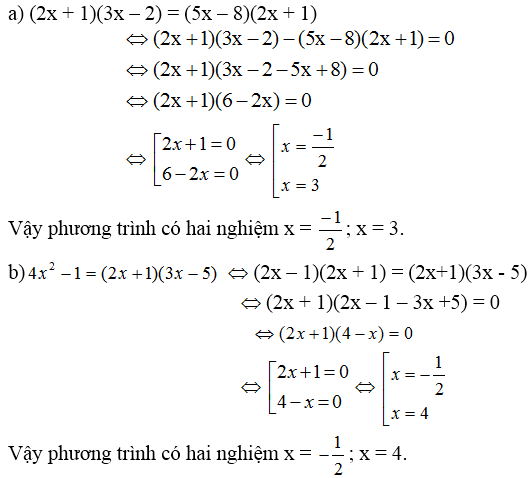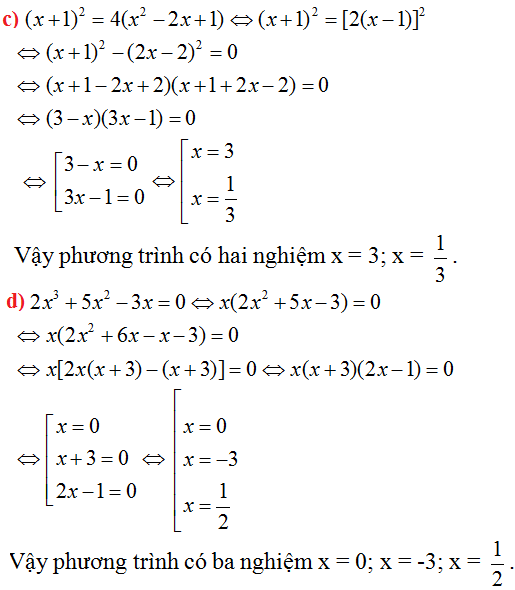Hãy nhập câu hỏi của bạn vào đây, nếu là tài khoản VIP, bạn sẽ được ưu tiên trả lời.

a) (x-1)(5x+3)=(3x-8)(x-1)
= (x-1)(5x+3)-(3x-8)(x-1)=0
=(x-1)[(5x+3)-(3x-8)]=0
=(x-1)(5x+3-3x+8)=0
=(x-1)(2x+11)=0
\(\Leftrightarrow\) x-1=0 hoặc 2x+11=0
\(\Leftrightarrow\) x=1 hoặc x=\(\dfrac{-11}{2}\)
Vậy S={1;\(\dfrac{-11}{2}\)}
b) 3x(25x+15)-35(5x+3)=0
=3x.5(5x+3)-35(5x+3)=0
=15x(5x+3)-35(5x+3)=0
=(5x+3)(15x-35)=0
\(\Leftrightarrow\) 5x+3=0 hoặc 15x-35=0
\(\Leftrightarrow\) x=\(\dfrac{-3}{5}\) hoặc x=\(\dfrac{7}{3}\)
Vậy S={\(\dfrac{-3}{5};\dfrac{7}{3}\)}
c) (2-3x)(x+11)=(3x-2)(2-5x)
=(2-3x)(x+11)-(3x-2)(2-5x)=0
=(3x-2)[(x+11)-(2-5x)]=0
=(3x-2)(x+11-2+5x)=0
=(3x-2)(6x+9)=0
\(\Leftrightarrow\) 3x-2=0 hoặc 6x+9=0
\(\Leftrightarrow\) x=\(\dfrac{2}{3}\) hoặc x=\(\dfrac{-3}{2}\)
Vậy S={\(\dfrac{2}{3};\dfrac{-3}{2}\)}
d) (2x2+1)(4x-3)=(2x2+1)(x-12)
=(2x2+1)(4x-3)-(2x2+1)(x-12)=0
=(2x2+1)[(4x-3)-(x-12)=0
=(2x2+1)(4x-3-x+12)=0
=(2x2+1)(3x+9)=0
\(\Leftrightarrow\)2x2+1=0 hoặc 3x+9=0
\(\Leftrightarrow\)x=\(\dfrac{1}{2}\)hoặc x=\(\dfrac{-1}{2}\) hoặc x=-3
Vậy S={\(\dfrac{1}{2};\dfrac{-1}{2};-3\)}
e) (2x-1)2+(2-x)(2x-1)=0
=(2x-1)[(2x-1)+(2-x)=0
=(2x-1)(2x-1+2-x)=0
=(2x-1)(x+1)=0
\(\Leftrightarrow\) 2x-1=0 hoặc x+1=0
\(\Leftrightarrow\) x=\(\dfrac{-1}{2}\) hoặc x=-1
Vậy S={\(\dfrac{-1}{2}\);-1}
f)(x+2)(3-4x)=x2+4x+4
=(x+2)(3-4x)=(x+2)2
=(x+2)(3-4x)-(x+2)2=0
=(x+2)[(3-4x)-(x+2)]=0
=(x+2)(3-4x-x-2)=0
=(x+2)(-5x+1)=0
\(\Leftrightarrow\) x+2=0 hoặc -5x+1=0
\(\Leftrightarrow\) x=-2 hoặc x=\(\dfrac{1}{5}\)
Vậy S={-2;\(\dfrac{1}{5}\)}

chẳng ai giải, thôi mình giải vậy!
a) Đặt \(y=x^2+4x+8\),phương trình có dạng:
\(t^2+3x\cdot t+2x^2=0\)
\(\Leftrightarrow t^2+xt+2xt+2x^2=0\)
\(\Leftrightarrow t\left(t+x\right)+2x\left(t+x\right)=0\)
\(\Leftrightarrow\left(2x+t\right)\left(t+x\right)=0\)
\(\Leftrightarrow\left(2x+x^2+4x+8\right)\left(x^2+4x+8+x\right)=0\)
\(\Leftrightarrow\orbr{\begin{cases}x=-2\\x=-4\end{cases}}\)vậy tập nghiệm của phương trình là:S={-2;-4}
b) nhân 2 vế của phương trình với 12 ta được:
\(\left(6x+7\right)^2\left(6x+8\right)\left(6x+6\right)=72\)
Đặt y=6x+7, ta được:\(y^2\left(y+1\right)\left(y-1\right)=72\)
giải tiếp ra ta sẽ được S={-2/3;-5/3}
c) \(\left(x-2\right)^4+\left(x-6\right)^4=82\)
S={3;5}
d)s={1}
e) S={1;-2;-1/2}
f) phương trình vô nghiệm

a) 2x(x-3)+5(x-3)=0
\(\Leftrightarrow\left(x-3\right)\left(2x+5\right)=0\)
\(\Leftrightarrow\left[{}\begin{matrix}x-3=0\\2x+5=0\end{matrix}\right.\)
\(\Leftrightarrow\left[{}\begin{matrix}x=3\\x=-\frac{5}{2}\end{matrix}\right.\)
Vậy: phương trình đã cho có tập nghiệm S=\(\left\{3;-\frac{5}{2}\right\}\)

a)(2x+1)(3x-2)=(5x-8)(2x+1)
⇔(2x+1)(3x-2)-(5x-8)(2x+1)=0
⇔(2x+1)(3x-2-5x+8)=0
⇔(2x+1)(-2x+6)=0
⇔2x+1=0 hoặc -2x+6=0
1.2x+1=0⇔2x=-1⇔x=-1/2
2.-2x+6=0⇔-2x=-6⇔x=3
phương trình có 2 nghiệm x=-1/2 và x=3

n) \(\left|3-x\right|+x^2-x\left(x+4\right)=0\)
\(\Rightarrow\left|3-x\right|+x^2-x^2-4x=0\)
\(\Leftrightarrow\left[{}\begin{matrix}3-x-4x=0\left(đk:3-x\ge0\right)\\-\left(3-x\right)-4x=0\left(đk:3-x< 0\right)\end{matrix}\right.\)
\(\Leftrightarrow\left[{}\begin{matrix}x=\dfrac{3}{5}\left(đk:x\le3\right)\\x=-1\left(đk:x>3\right)\end{matrix}\right.\)
\(\Rightarrow\left[{}\begin{matrix}x=\dfrac{3}{5}\\x\in\varnothing\end{matrix}\right.\)
Vậy \(x=\dfrac{3}{5}\)
m) \(\left(x-1\right)^2+\left|x+21\right|-x^2-13=0\)
\(\Rightarrow x^2-2x+1+\left|x+21\right|-x^2-13=0\)
\(\Leftrightarrow-2x-12+\left|x+21\right|=0\)
\(\Leftrightarrow\left[{}\begin{matrix}-2x-12+x+21=0\left(đk:x+21\ge0\right)\\-2x-12-\left(x+21\right)=0\left(đk:x+21< 0\right)\end{matrix}\right.\)
\(\Leftrightarrow\left[{}\begin{matrix}x=9\left(đk:x\ge-21\right)\\x=-11\left(đk:x< -21\right)\end{matrix}\right.\)
\(\Rightarrow\left[{}\begin{matrix}x=9\\x\in\varnothing\end{matrix}\right.\)
Vậy \(x=9\)
e) \(\left|5x\right|=3x-2\)
\(\Rightarrow5\cdot\left|x\right|=3x-2\)
\(\Leftrightarrow5\cdot\left|x\right|-3x=-2\)
\(\Leftrightarrow\left[{}\begin{matrix}5x-3x=-2\left(đk:x\ge0\right)\\5\cdot\left(-x\right)-3x=-2\left(đk:x< 0\right)\end{matrix}\right.\)
\(\Leftrightarrow\left[{}\begin{matrix}x=-1\left(đk:x\ge0\right)\\x=\dfrac{1}{4}\left(đk:x< 0\right)\end{matrix}\right.\)
\(\Rightarrow\left[{}\begin{matrix}x\in\varnothing\\x\in\varnothing\end{matrix}\right.\)
Vậy \(x\in\varnothing\)
g) \(\left|-2,5x\right|=x-12\)
\(\Rightarrow2,5\cdot\left|x\right|=x-12\)
\(\Leftrightarrow2x5\cdot\left|x\right|-x=-12\)
\(\Leftrightarrow\left[{}\begin{matrix}2,5x-x=-12\left(đk:x\ge0\right)\\2,5\cdot\left(-x\right)-x=-12\left(đk:x< 0\right)\end{matrix}\right.\)
\(\Leftrightarrow\left[{}\begin{matrix}x=-8\left(đk:x\ge0\right)\\x=\dfrac{24}{7}\left(đk:x< 0\right)\end{matrix}\right.\)
\(\Rightarrow\left[{}\begin{matrix}x\in\varnothing\\x\in\varnothing\end{matrix}\right.\)
Vậy \(x\in\varnothing\)

\(a,\left(2x^2+1\right)+4x>2x\left(x-2\right)\)
\(\Leftrightarrow2x^2+1+4x>2x^2-4x\)
\(\Leftrightarrow4x+4x>-1\)
\(\Leftrightarrow8x>-1\)
\(\Leftrightarrow x>-\frac{1}{8}\)
\(b,\left(4x+3\right)\left(x-1\right)< 6x^2-x+1\)
\(\Leftrightarrow4x^2-4x+3x-3< 6x^2-x+1\)
\(\Leftrightarrow4x^2-x-3< 6x^2-x+1\)
\(\Leftrightarrow4x^2-6x^2< 1+3\)
\(\Leftrightarrow-2x^2< 4\)
\(\Leftrightarrow x^2>2\)
\(\Leftrightarrow x>\pm\sqrt{2}\)










a) \(2x^3+5x^2-3x=0\Leftrightarrow x\left(2x^2+5x-3\right)=0\)
\(\Leftrightarrow\left[{}\begin{matrix}x=0\\2x^2+5x-3=0\end{matrix}\right.\Leftrightarrow\left[{}\begin{matrix}x=0\\x=-3\\x=\frac{1}{2}\end{matrix}\right.\)
Vậy \(\left[{}\begin{matrix}x=0\\x=-3\\x=\frac{1}{2}\end{matrix}\right.\)
b) \(2x^3+6x^2=x^2+3x\Leftrightarrow2x^3+5x^2-3x=0\)
Vậy $\orpt{\begin{matrix}x=0\\x=-3\\x=\frac{1}{2}\end{matrix}}$ (Giải câu a)
c) \(x^3-12=13x\Leftrightarrow x^3-13x-12=0\)
\(\Leftrightarrow\left(x+1\right)\left(x^2-x-12\right)=0\)
\(\Leftrightarrow\left(x+1\right)\left(x-4\right)\left(x+3\right)=0\)
\(\Leftrightarrow\left[{}\begin{matrix}x=-1\\x=4\\x=-3\end{matrix}\right.\)
Vậy $\orpt{\begin{matrix}x=-1\\x=4\\x=-3\end{matrix}}$
d) \(\left(x-1\right)\left(x^2+5x-2\right)-\left(x^3-1\right)=0\)
\(\Leftrightarrow\left(x-1\right)\left(x^2+5x-2\right)-\left(x-1\right)\left(x^2+x+1\right)=0\)
\(\Leftrightarrow\left(x-1\right)\left(4x-3\right)=0\)
\(\Leftrightarrow\left[{}\begin{matrix}x=1\\x=\frac{3}{4}\end{matrix}\right.\)
Vậy \(\left[{}\begin{matrix}x=1\\x=\frac{3}{4}\end{matrix}\right.\)